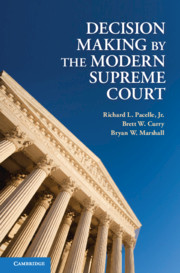Book contents
- Frontmatter
- Contents
- Acknowledgments
- 1 The Supreme Court
- 2 Heuristic Models of Judicial Decision Making
- 3 Building an Integrated Model of Decision Making
- 4 Decision Making on the Modern Supreme Court
- 5 Building a New Legacy
- 6 Sharing the Protection of Minorities
- 7 Avoiding Another Self-Inflicted Wound
- 8 Policing the Boundaries
- 9 Conclusion
- Measurement Appendix
- Cases Cited
- References
- Index
7 - Avoiding Another Self-Inflicted Wound
Constitutional Economic Cases
Published online by Cambridge University Press: 05 June 2012
- Frontmatter
- Contents
- Acknowledgments
- 1 The Supreme Court
- 2 Heuristic Models of Judicial Decision Making
- 3 Building an Integrated Model of Decision Making
- 4 Decision Making on the Modern Supreme Court
- 5 Building a New Legacy
- 6 Sharing the Protection of Minorities
- 7 Avoiding Another Self-Inflicted Wound
- 8 Policing the Boundaries
- 9 Conclusion
- Measurement Appendix
- Cases Cited
- References
- Index
Summary
By including Footnote Four in the Carolene Products decision, the Supreme Court was, in essence, admitting that it had overreached. It was also trying to salvage some of its institutional integrity. Loathe to repeat its jurisprudence of the recent past in which it had struck down numerous New Deal programs as unconstitutional, it set out to chart a different course. Rather than write its own views on economic policy matters into constitutional law, the Court would presume such legislation to be constitutional (Miller 1968). It was retreating from the wanton judicial activism of substantive due process that occasionally marked its economic jurisprudence. As we noted in Chapters 5 and 6, this change in orientation allowed the Court to pivot to a greater emphasis on individual rights and liberties issues. The effect of this new posture was to bring relative stability to its constitutional economic decisions for decades to come. By clearing out the constitutional underbrush, the Court could begin to address and resolve the narrower statutory economic cases that are the subject of Chapter 8. Therefore, in articulating the Court's legal standard for assessing the constitutionality of economic cases, Footnote Four brought stability to the law and enabled the institution to turn its focus to what it considered more pressing issues.
Although even the most seasoned observers would be hard-pressed to generate a list of the Warren Court's economic cases decided on constitutional grounds, the cases it did hear reflected this new deference toward governmental action in the economic realm.
- Type
- Chapter
- Information
- Decision Making by the Modern Supreme Court , pp. 141 - 166Publisher: Cambridge University PressPrint publication year: 2011



